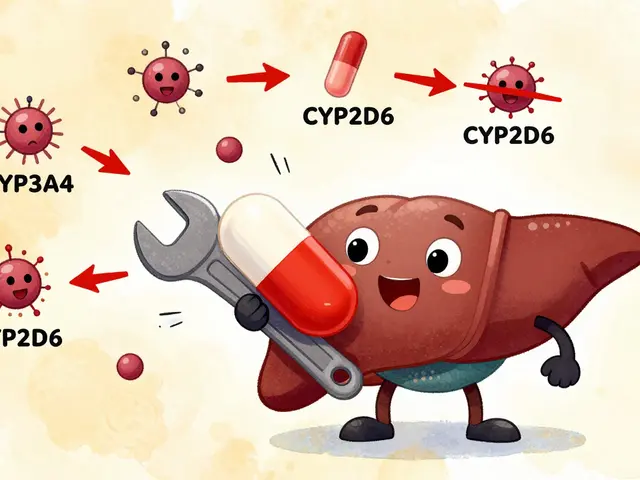Understanding Indinavir and Its Importance in HIV Treatment
Indinavir is an antiviral medication that is used in combination with other medications to treat human immunodeficiency virus (HIV) infections. It works by blocking the action of a protease enzyme that the virus needs to replicate, thus slowing down the spread of the infection.
As a part of highly active antiretroviral therapy (HAART), Indinavir can help improve the quality of life for those living with HIV. It is crucial for individuals with HIV to adhere to their medication regimen to maintain the effectiveness of the treatment and prevent the development of drug-resistant strains of the virus.
The Emotional Impact of an HIV Diagnosis
Receiving an HIV diagnosis can be a life-altering event. It is common for individuals to experience a wide range of emotions, including shock, fear, anger, and sadness. Moreover, the stigma associated with HIV can lead to feelings of isolation and depression.
It is essential for family and friends to provide emotional support during this challenging time. By offering a shoulder to lean on and a listening ear, loved ones can help alleviate some of the emotional burden that comes with an HIV diagnosis.
Supporting Loved Ones Through Their HIV Treatment Journey
As family and friends, it is crucial to educate ourselves about HIV and its treatment, including medications like Indinavir. Gaining a better understanding of the condition and its management can enable us to provide practical support and encouragement to our loved ones throughout their treatment journey.
Some ways to offer support include accompanying them to medical appointments, assisting with medication management, and providing a safe and non-judgmental space for them to express their feelings and concerns.
Encouraging Adherence to Medication Regimens
Adhering to the prescribed medication regimen is critical for individuals living with HIV. Skipping doses or not taking medications as directed can lead to treatment failure and the development of drug-resistant strains of the virus.
Family and friends can play a vital role in encouraging adherence by helping their loved ones establish routines, offering reminders, and providing emotional support when challenges arise.
Addressing Mental Health and Well-Being
The emotional toll of living with HIV can have a significant impact on an individual's mental health. Anxiety, depression, and feelings of isolation are common among people living with HIV.
Family and friends should be vigilant in recognizing signs of mental health concerns and encourage their loved ones to seek professional help if needed. Providing a support network and promoting open communication can also help improve overall well-being.
Helping Loved Ones Maintain a Healthy Lifestyle
A healthy lifestyle is important for individuals living with HIV, as it can help improve their overall health and well-being. Encourage loved ones to eat a balanced diet, exercise regularly, get enough sleep, and manage stress effectively.
Offering to join them in activities or providing resources and information on maintaining a healthy lifestyle can show your support and help improve their quality of life.
Challenging HIV Stigma and Discrimination
Despite advancements in HIV treatment and understanding, stigma and discrimination still persist. This can create barriers to accessing care, disclosing one's status, and maintaining social connections.
As family and friends, we can challenge HIV stigma by educating ourselves and others, addressing misconceptions, and advocating for the rights of people living with HIV.
Creating a Supportive Environment for HIV-Positive Loved Ones
Creating a supportive environment for individuals living with HIV can make a significant difference in their journey. By offering emotional support, assisting with practical aspects of treatment, and promoting mental health and well-being, we can help our loved ones navigate the challenges of living with HIV.
Together, we can foster a community of care and understanding for those affected by HIV and contribute to their overall health and happiness.





10 Comments
Kevin Cahuana
I’ve seen a lot of families find a rhythm by setting a daily reminder on a shared calendar, so nobody forgets a dose. Pairing the pill with a regular activity like brushing teeth turns it into a habit that sticks. It also helps when a buddy texts a quick “got your meds?” just to keep the momentum going. When the routine feels natural, the stress around adherence drops dramatically. Keep the tone light and celebrate each day the regimen stays on track.
Deb Kovach
One practical way to boost adherence is to use a pill organizer with compartments for each day of the week. Fill it together after the pharmacy visit; the visual cue reduces the chance of missing a dose. Encourage the person to keep a simple log-just a check mark on a calendar when the dose is taken. If a dose is missed, discuss it openly and adjust the plan rather than assigning blame. Regular check‑ins with the healthcare team, even via telehealth, keep the treatment on track and catch side‑effects early.
Ajay Kumar
Talking openly about side‑effects can take a lot of pressure off the person living with HIV. When a friend says “I’m here if you ever feel off, just let me know,” it builds trust. Sharing a grocery list of immune‑boosting foods can also be a fun activity you do together. Small gestures like walking to the park for a quick jog keep both bodies and spirits healthy. Remember, the goal isn’t to police the medication but to be a steady source of encouragement.
Danielle Ryan
Wow!!! This is mind‑blowing!!!
Sarah Pearce
i guess its ok but kinda long read lol. the part about med reminders could be shorter. still decent i guess.
vedant menghare
In the tapestry of communal support, the threads of empathy and knowledge intertwine to form a resilient safety net for those confronting HIV. When kin and companions immerse themselves in the pharmacodynamics of agents such as Indinavir, they transcend mere passive concern and become active custodians of health. The act of accompanying a loved one to a consultation, bearing witness to the clinician’s counsel, crystallizes solidarity in a tangible form. Moreover, fostering an environment where discourse on mental well‑being is unfettered diminishes the pernicious shadows of stigma. By curating a regimen of shared meals rich in antioxidants, synchronized exercise routines, and nightly reflections, the collective breathes vitality into the therapeutic journey. It is incumbent upon us, as members of an interwoven society, to champion informed advocacy and dismantle misconceptions that perpetuate discrimination. Ultimately, the confluence of informed stewardship and compassionate presence can transform the lived experience of HIV from one of isolation to one of communal empowerment.
Pramod Hingmang
That pill organizer tip is gold. I’ve seen families line them up on the kitchen counter and it just works. Also a quick text reminder keeps everyone on the same page.
Richa Ajrekar
While your prose is vivid, there are a few grammatical slips – “tapestry” should be paired with “of”, not “in”. Also, “interwoven society” feels redundant. Still, the passion shines through.
Adam Baxter
Let’s keep the momentum! Small edits don’t dim the message – the call for solidarity is what matters. Stay pumped and keep spreading the word.
Robyn Chowdhury
The societal obligation to nurture those living with HIV extends beyond clinical prescriptions. When families adopt a holistic approach, they address both physiological and psychological dimensions of care. Engaging in shared meals fortified with lean proteins and leafy greens not only bolsters immune function but also creates moments of connection. Regular physical activity, even a modest walk in the park, raises endorphin levels and mitigates depressive tendencies. Consistent medication adherence, reinforced by gentle reminders, remains the cornerstone of viral suppression. Yet, the silent battle against stigma often eclipses these tangible interventions. By openly discussing HIV status within trusted circles, individuals dismantle the veil of secrecy that fuels discrimination. Educational outreach, whether through community workshops or social media infographics, demystifies misconceptions about transmission. Legislative advocacy further secures rights to equitable healthcare and protects against workplace bias. In practice, a supportive environment can be as simple as designating a “medication corner” where doses are stored visibly. It can also involve scheduling joint appointments so that loved ones feel accompanied rather than abandoned. Psychological support, perhaps via counseling or peer‑support groups, provides a safe arena for processing trauma. The convergence of these strategies cultivates resilience, turning vulnerability into strength. Families that celebrate each milestone-no matter how small-reinforce a narrative of hope and progress. Ultimately, the collective effort transforms the HIV journey from an isolating ordeal into a shared expedition toward wellness. 🌟💪🤝